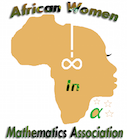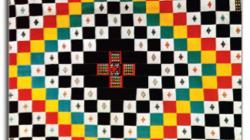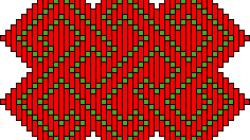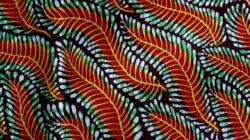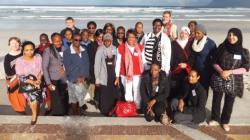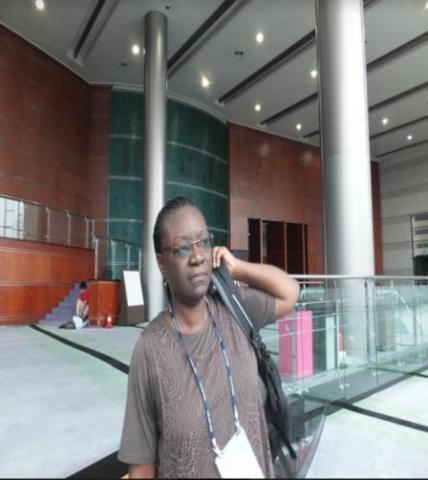
President of the African Women in Mathematics Association and first woman in Burkina Faso holding a doctorate in mathematics
Education
- 1994: « D.E.A. de Mathématiques » at University of Ouagadougou on Lie triple superalgebras
- 1999: « Doctorat de Troisième Cycle » at University of Ouagadougou on Cohomology of Lie triple superalgebras
- 2009: Ph.D thesis at University Blaise Pascal of Clermont-Ferrand, on Extension of the canonical trace and associated determinants.
Professional experience
- 1994-2001: Stand-in teacher at Mathematics Department at University of Ouagadougou
- 2001-2013: Assistant Professor at University of Ouagadougou
- Current: Maître de conferences at University Joseph Ki-Zerbo.
Questionnaire
Your story with mathematics
Can you tell us something about your story? Why did you join the field of Mathematics?
I am a woman mathematician at the department of Mathematics at university Joseph Ki-Zerbo. I joined the field of mathematics because since high school I was good in mathematics and also in many other subjects. But I have preference in logic and computations rather than literature or social sciences. So since that time and after high school diploma (Baccalauréat) I decided to follow studies in mathematics and after a career in the fields of mathematics.
What fascinates you about Mathematics?
I was fascinated by the fact that I could do mathematics by just understanding well the subject. Also I like logic, the fact to combine some hypothesis or concepts to get other results and so to solve a problem. I like also the possibility of generalizations of some concepts into various and unexpected ways.
Did you have a role model that influenced your decision to become a mathematician?
I didn't have any role model to follow but I was influenced by my teachers ofmathematics at high school.
Has anyone supported you in your choice and during your career?
As I said above, I was encouraged by my teachers of mathematics. Also I was supported by my friends during my studies. In my career, I was encouraged by some colleagues, friends and family.
Would you see it was easy for you to enter your field, and ultimately excel? What challenges did you encounter on the way?
Since I chose mathematics at high school, I followed this way in my career. It was not so easy to enter this field. Even if your family and friends are very proud of you when you succeed in mathematics at high school, in the meantime some of your schoolmates make you some miseries because according to them, you do not have the right to be among them and they let you know. Also considering the same prejudices that suggest that women are not as good as men in math or that some men do not want to see women at the same level as them, I always feel like I have to work hard twice than men for the same result.
Career and Family
Do you come from an academic family? How does your family regard your career choice?
I don't come from academic family and at the beginning my family didn't understand my choice of career and tried to push me to change it.
Tell us about balancing family life with work life?
As a woman, it is very hard to manage private life and career in mathematics, mainly because so far in the society women are supposed to attend to their families in terms of food and caring for children. This leaves them with little time to attend to their research. It is then necessary somehow to find a balance to manage both private and work life.
Women and Mathematics
What were the biggest obstacles you had to overcome? Did you ever have the impression that it would be easier/harder if you were male? What kind of prejudices, if any, did you have to face? How did that make you feel? Were you able to overcome these? Do you have anything else that you’d like to tell us about?
Since I chose mathematics at high school, I followed this way in my career. But being a woman in this field is not so easy and you have to face big challenges to face such as:
- cultural and traditional bias,
- the intolerance of some peers who do not accept that a girl can compete in "their fields" of competence,
- the lack of role model of African women mathematicians in which you can refer to encourage yourself.
Of course, sometimes I thought that it would be easy for me if I was a male since men do not have to face all the obstacles mentioned above. Nevertheless being a woman gave me certain strength of character that allowed me to overcome these obstacles and continue today a career in mathematics.
Did you encounter any specific difficulties relating to the field of mathematics?
The main difficulty in the field of mathematics in my country, Burkina Faso, is the lack of grant or fund for research visits and participation in conferences. Also, the lack of libraries for research. However this last point is attenuated by collaborations with colleagues in other countries which can give you access to diverse libraries and other types of bibliographic resources.
Tell us about the organizations for women mathematicians that you are a part of? How has this helped your career?
I am currently president of the African Women in Mathematics Association (AWMA). AWMA was established in 2013 to contribute to the development of mathematics and women in mathematics in Africa. Starting from workshops for African women mathematicians, we organized within the commission "women and maths" of the African Mathematical Union (AMU), we saw the need to create an association to better collaborate with similar associations like EWM in Europe and AWM in USA. Thus we participate in the committee for Women in Mathematics (CWM) of the International Mathematical Union (IMU). AWMA has a website to interact with African women mathematicians and share information. Thanks to AWMA, I met other women mathematicians, whether in Africa, in Europe or elsewhere in the world but also mathematicians. This allowed me to establish external contacts, exchanges and scientific collaborations with some of them. I also participated in international scientific meetings such as the International Congress of Mathematicians (ICM), the Pan-African Congress of Mathematicians (COPAM) and also in search of mathematics schools.
Do you consider it necessary to organize special programs like Girl’s Day promoting mathematics for girls in schools? What else, do you think, could further be done to support woman with mathematics as their career?
It is necessary to organise such a program and also any other program aiming to promote mathematics among young girls at school. This can be done for example by working to publicise role models to stimulate vocations among young girls and help them in their choice of studies and careers in mathematics. Also, national or regional associations of women in mathematics like AWMA are needed to help women meet other women in Mathematics and share ideas and collaborations in order to encourage African women to take up their studies in mathematics and to promote mathematics among women.
Teaching mathematics, especially to non-mathematicians, can be a challenge. What is your strategy to catch and keep the attention of your audience?
My strategy is to find illustrative examples in their field of study or at least close to their field and also in everyday life.
How would you explain your research to a layman (non-specialist)?
At the beginning of my career, my research concerned algebra, specially superalgebra versions of the concepts of representations and weak representations of Malcev algebras and Lie triple systems. Also generalization of results known on Malcev algebra to Lie superalgebra. I then moved on pseudo differential operators which are generalisation of differential operators that generalize the operator of differentiation. The introduction of pseudo differential operators offers a fundamental tool in the theory of partial differential equations in terms of operator theory and functional analysis.
Conclusion
What are your biggest achievements, and what your biggest failures?
My biggest achievement is twofold:
- being the first woman in Burkina Faso holding a doctorate in mathematics and also defending two theses in two different areas of mathematics, the first one in algebra and the second one in the theory of pseudodifferential operators.
- Contributing to the creation of an association of women mathematicians (AWMA) which had as corollary the creation of several national associations for the promotion of the African woman mathematician.
My regret is that so far there are not many girls embarking on studies in mathematics but I hope that our association AWMA can help to improve this situation.
Do you have a dream? Any particular problem you dream to solve now?
My dream of course would be that more women in my country and in Africa are getting into a career in mathematics. I am aware that it will not happen immediately but by encouraging women and girls to take up and continue their studies in mathematics, giving them role models to follow as this project of portraits of African women mathematicians aims to do.
Which advice would you give to young girls who want to engage a career in mathematics?
Being a mathematician is a good career. If you enjoy doing mathematics, go on and just do it. Looking back, we realize that we could have acted differently in some situations and we could make best decisions in some others situations, so If I had the option to give advice to a younger version of myself, I would draw her attention on it.
